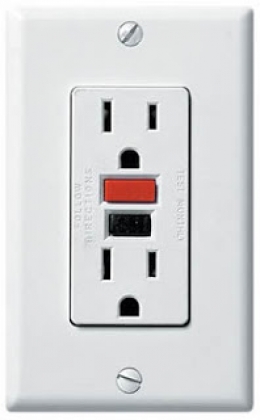Here's a few things you can do yourself and a few things you shouldn't do yourself. Always remember, if you're concerned about an electrical issue you can give us a call. We're ready and willing to investigate to ensure the safety of your home and family.
DO Label your panel
 It doesn't matter what you call it, fuse box, breaker box, circuit breaker box, all that matters is that it's labeled. It doesn't matter if you rent or own, when the power goes out, or do-it-yourself projects are in progress, it's best to be prepared.
It doesn't matter what you call it, fuse box, breaker box, circuit breaker box, all that matters is that it's labeled. It doesn't matter if you rent or own, when the power goes out, or do-it-yourself projects are in progress, it's best to be prepared.
We've spent many an hour yelling back and forth across the house while trying to find the right breaker to turn off, "How about now?" ...."No!"
Does that sound familiar? Try installing a light without knowing which power grid to take down, or finding out which fuse is blown in the bathroom, or bringing things back up one switch at a time if adverse weather takes your power out — it's not easy if it isn't labeled!
One of the first things we do upon moving into a new place is making sure the fuse box is labeled. It's easier to know what's what ahead of time, than guessing as we take down each switch one at a time (which usually results in having to reset every clock in the house) to find the right one!
So head to the box, unscrew a fuse or flip a switch and see what outlets don't work or which lights go out. Mark the rrom location next to the fuse or breaker. Turn it back on and move on to another one. Before long, you'll know which fuses/breakers are for which room!
DO Try the Reset Button

That funny outlet is also called a Ground Fault Circuit Interrupter and it's a special outlet designed to protect you. It is probably located somewhere close to water; the kitchen sink, the bathroom, outdoors, or the garage. The outlet is designed to constantly measure the current in the black wire against the current in the white wire. A very small difference between the two wires will cause the outlet to shut off the current very quickly. If you drop the hair dryer into the bathtub, or run over the extension cord with the electric mower, the outlet shuts off before you can suffer from a potentially dangerous electric shock. The buttons are there so you can test the operation of the outlet. Since the outlet is close to water, and has metal moving parts, it is possible that the parts can rust. That is why it is important to test it once a month. Go ahead, just push the TEST button. The button should pop out and the outlet should shut off. Then push the RESET button to turn the power back on. If the outlet does not work like it should even after you've pressed the rest button, give us a call, it can be replaced pretty inexpensively but is a crital component to keep you safe in a wet environment.
For the safety of you and your family, NEVER replace a Ground Fault Circuit Interrupter outlet with a regular outlet or receptacle.
DON'T Remove the cover of your electrical panel
Turning on or off circuit breakers or replacing fuses is the only thing you should be doing with your fuse box. Anything that would require removing the protective cover should be left to a qualified electrician. Just like most of your appliances — there's no user-serviceable parts inside.
The chance for a very serious injury exists if you remove the protective cover of your fuse box.
DON'T Use a different size fuse
Screw-in fuses are specifically rated and marked for the load they handle. If one blows and needs to be replaced they should only be replaced with a fuse marked with the same amperage. Using a fuse with a lower amperage will just mean the fuse will blow again and sooner. Using a fuse with a higher amperage defeats the purpose of the fuse and can lead to a dangerous electrical fire.
DON'T Insert foreign objects into outlets
Don't ever insert anything other than an approved electrical plug into an electrical outlet. Anything inserted into the outlet, even if it's not metal, can conduct electricity creating a potentially hazardous situation.
If a cord sparks, or doesn't supply power unless it's 'wiggled', remove it immediately and either replace the cord or the appliance. That 'sparking' could lead to a fire.

